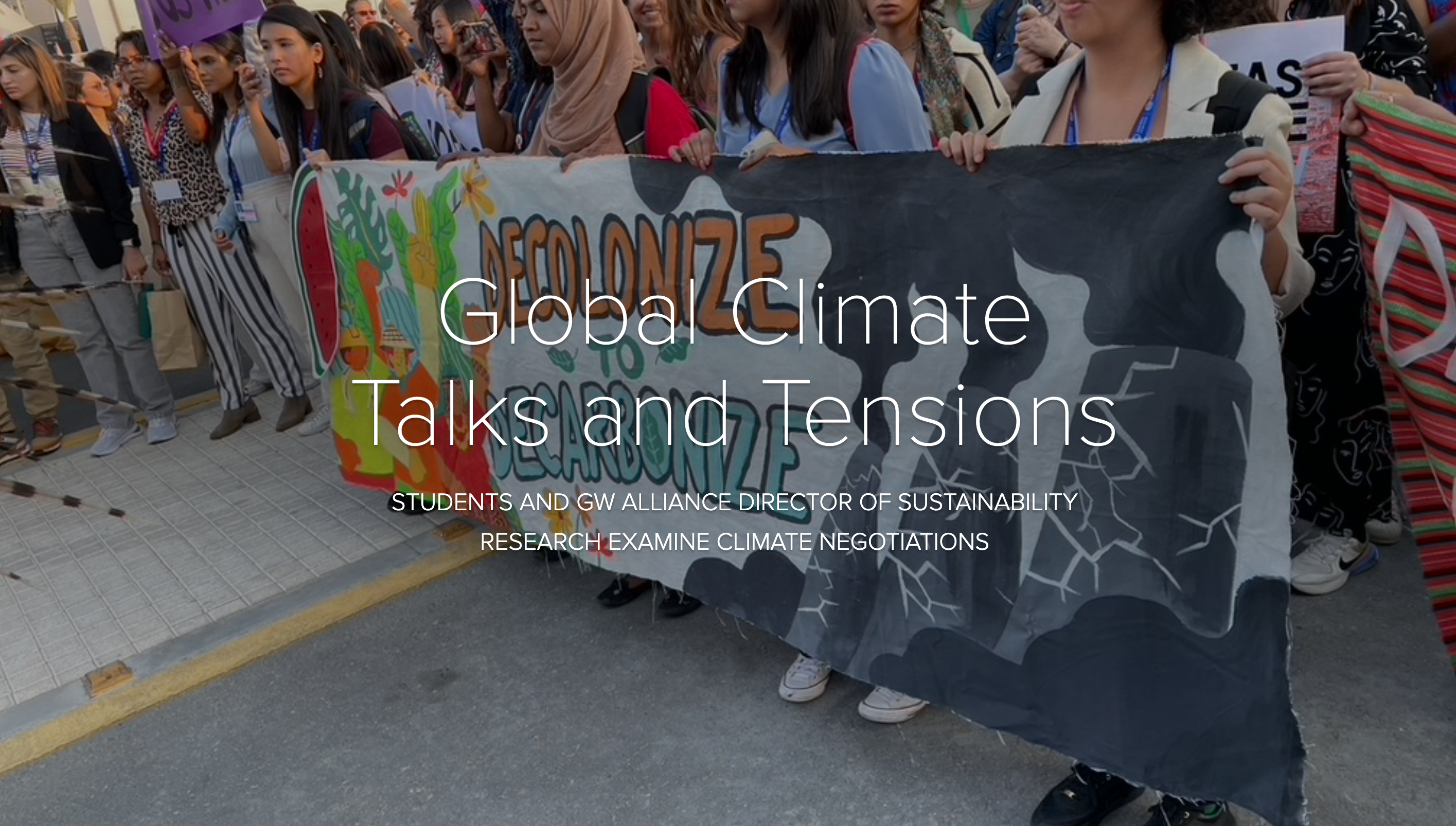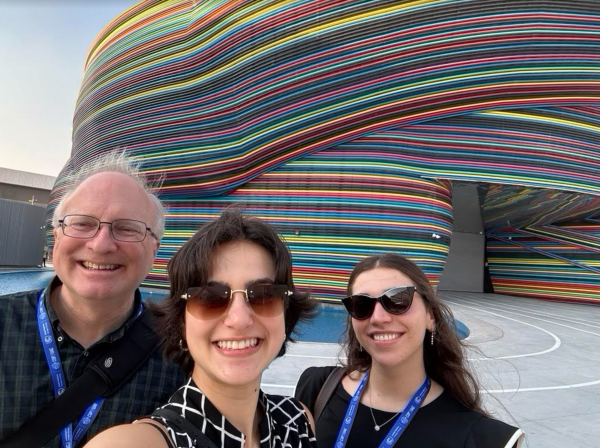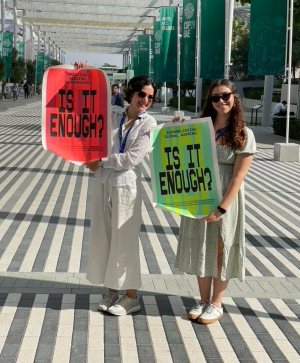By Anneliese Palmer
Plans are in motion for the first “COP of Peace” in November 2024, with organizers focusing on preventing future climate-fueled conflicts and using international cooperation on environmental issues to mend existing tensions. Governments may be called upon to adhere to a “COP truce”, inspired by the Olympic truce, pausing hostilities during the annual United Nations 29th Climate Conference of Parties(COP), according to recent reports from the Bonn Dialogue. Amid escalating geopolitical tensions, this year’s climate conference–COP29–is scheduled to take place in Baku, the capital city of Azerbaijan, while two major wars continue to ravage neighboring regions - the Ukraine invasion and the Israel-Gaza conflict.
Against this tense backdrop, the need for a global response to climate change remains clear: to avoid the most devastating consequences of climate change, countries, industries, businesses, and individuals must make a substantial reduction in greenhouse gas emissions over the next decade.
Last December, representatives from nearly 200 countries went to COP28 in Dubai, United Arab Emirates, to raise global ambition and accelerate national actions on climate change to meet the goals of the Paris Agreement to reduce emission. George Washington University’s Anna Shah, Hannah Silber, and Robert Orttung were among thousands of attendees to observe the official negotiations and learn about the role of research and academia in climate diplomacy.
A key issue at COP28 was the first-ever “Global Stocktake,” which assessed the world’s collective progress toward addressing the climate crisis. The Global Stocktake synthesis report published in September 2023 revealed that the world is far off track from its goal of holding global temperature rise to 1.5 degrees C (2.7 degrees F) to avoid some of the most disastrous impacts of climate change. It was the most important issue that global organizations watched to see how countries, companies, cities, and financial institutions responded.
The cohort from GW saw the tension between scientific expertise, the lived experiences of communities most affected by climate change, and the role for academic research.
While negotiators make up only 10% of attendees at the climate conferences, academics comprise a significant portion – 25%. Orttung, a research professor of international affairs in the Elliot School of International Affairs and director of sustainability research at the GW Alliance, said students and researchers play a valuable role in contributing ideas and solutions. Their work can bridge the gap between scientific and indigenous knowledge, informing better governance and potentially sparking innovative startups, he added.
“We're seeing a positive trend of academics becoming more involved, with universities like ours collaborating and promoting researcher-developed climate solutions,” said Orttung. “This increased engagement is crucial for turning research into practical solutions.”
Money talks at climate conferences, and this conference was no exception. Wealthy nations and powerful lobbies sent representatives to the COP meeting, while those most impacted by climate change – often from historically marginalized communities – lacked the resources to participate.
Silber, who attended GW and recently graduated with a public health degree, observed that financial disparity excluded crucial voices from the table, adding that to achieve true equity the UN needs to overhaul its structure and prioritize inclusion. Instead of allocating seats by country, Silber proposes a system that amplifies the voices directly affected by climate change, bringing diverse perspectives to the front of the diplomatic sphere.
“I think, at the end of the day, usually, it all boils down to money, and the fact that some have so much money for the top of your oil lobbyists to come to COP,” said Silber. “But there are people who are restricted from coming to COP because they have been historically disinvested and simply don't have the money to make it halfway across the world to advocate for their needs.”
The tension between scientific expertise and the lived experiences of communities most affected by climate change stood out for the GW students. “We rightly value scientific knowledge, but often overlook the wisdom of local communities, including indigenous knowledge,” said Silber. “This is despite the fact that they've been stewards of the land for generations and have valuable insights for climate action.” While initiatives like the UNFCCC’s emphasis toward inclusion is encouraging, scientific knowledge still holds more weight.
The students deepened their understanding of the diplomatic process and Orttung learned from the experience, too. “It was good to have students along, because they're much more open to new experiences; rather than some old geezer professor, who didn’t have such an emotional reaction to the lesson,” said Orttung.
The emotional intensity of COP negotiations can be a powerful learning experience, especially for students who are often more receptive to raw emotion, Orttung explained. “While faculty involvement remains valuable, increasing student participation is crucial,” he said.
GW was lead organizer in a 13-member university cohort who shared a pavilion space, while other universities had their own pavilions. Orttung saw a range of student involvement across universities. He’d like to see a model where students take the lead, allowing them to gain valuable experience in climate diplomacy. This would build a knowledge base and refine communication strategies to effectively convey key positions and integrate them into the broader COP conversation, he explained.
For Shah, a senior studying international business and minoring in German and sustainability, the meeting was a journey from skepticism to empowerment. Shah observed a protest erupt amidst the COP and explained that it was a sea of diverse voices. Witnessing the power of collective action, she understood the unique privilege of unfettered protest in the U.S. She also now understands that the annual COP meeting is the culmination of a year-long process, with preparatory meetings happening throughout the year.
Eager to learn more about the inner workings of the climate negotiations, Shah is interested in understanding more about who participates, their financial flows, and the pressure points. She’d also like to understand how people advocate for change both through public demonstrations and within the negotiation rooms. She said, “I'd love to learn more about how to stay engaged and contribute throughout this ongoing cycle.”
Shah flagged a concern that some young participants seemed included for appearances only. Young people were “tokenized,” she said, without genuine opportunities to contribute. While youth representation in the talks has increased, young people seemed present for photos or soundbites, rather than on truly integrating their voices into the discussions, she explained, adding. “I believe meaningful engagement is crucial, and I'm curious to hear if other youths felt similarly.” But this wasn't unique to young and early career voices; the minority groups Shah spoke with also experienced this.
“I hope this is just the beginning of our deeper involvement,” Orttung said. “Increased student participation, equipped with better communication skills, can significantly enhance engagement with negotiators, diplomats, and the broader public.”
He said momentum is building. Annual preparatory talks leading up to COP29 include inter-sessional meetings in Bonn, Germany, and New York, N.Y. A major biodiversity conference will also take place this year in Bogota, Colombia.
World governments have formed global agreements to advance the dialogue between nations. Four months have passed since the COP28 meeting, and major problems still need to be addressed. The ability to resolve these matters quickly will have a profound impact on COP29 in Azerbaijan and will test the world’s capabilities for the transition that lies ahead.
Anneliese (Lisa) Palmer is Journalist in Residence at the GW Alliance for a Sustainable Future. She is a Research Professor of Science Communication at the Columbian College of Arts and Sciences and Senior Editor at Planet Forward.




